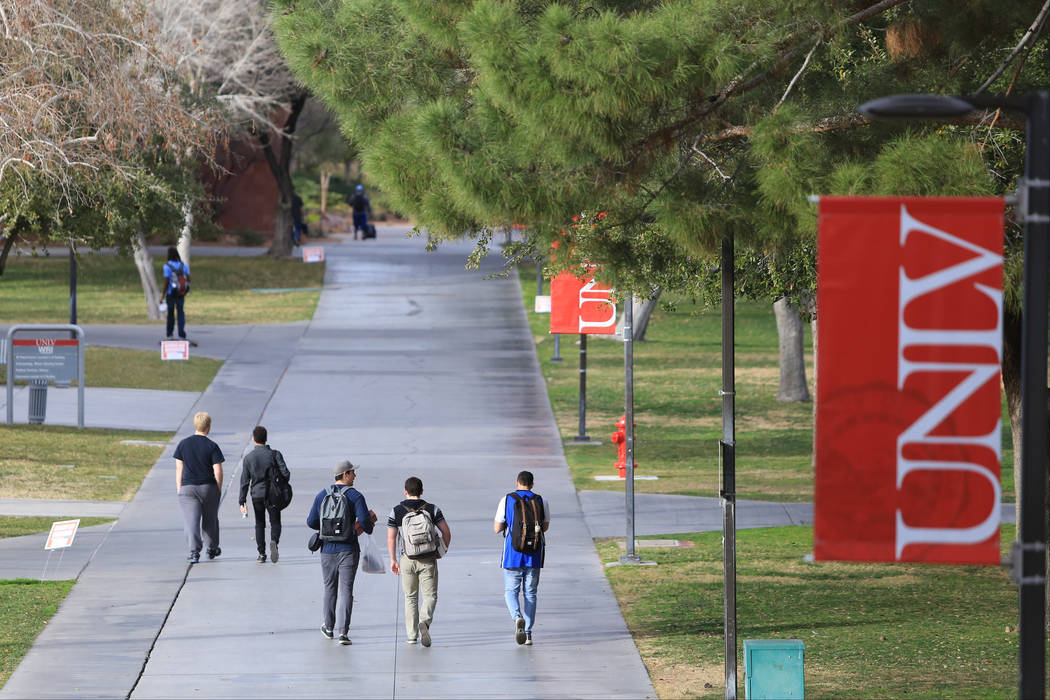UNLV promises to distribute $12M in financial aid account
UNLV officials say they will step up efforts to distribute more than $12 million that has accumulated over the past few years in the university’s financial-aid coffers.
The balance in the student access fee account, intended to help needy students pay for their educations, became a bone of contention last week for the Nevada Board of Regents, when it was revealed that the university was running a surplus projected to grow to more than $13 million this year.
“I want to put as much financial aid out as possible,” Regent Jason Geddes said during Friday’s meeting in Reno. “What is the timeline of your plan to zero this out? I expect a small balance. The goal should be zero.”
Gerry Bomotti, senior vice president for finance and business at UNLV, agreed that the university needs “to do a better job with undergraduate access fees in getting the funds out for needy students.”
Growth of the UNLV balance has accelerated in recent years, rising from $7.5 million in 2012 to about $8 million in 2015 before leaping to $12 million.
In contrast, the balance in the same fund at the University of Nevada, Reno, is expected to be $1.7 million this year.
Bruce Shively, associate vice president for planning, budget and analysis at UNR, said the university manages its account “at a much tighter level” than mandated.
“We’ve always tried to keep that low,” he said. “Our guiding philosophy is that if students pay these fees, they need to see some benefits from those.”
Fee increase seen as factor
Bomotti said this week that the fund’s growth over the past couple of years largely stems from a 4 percent student fee increase in 2016.
“We at UNLV took 28 percent of that revenue from the 4 percent fee increases and put it into student access,” Bomotti said, adding that officials had previously allocated only around 15 percent of fee increases to the financial-aid fund.
“It’s a huge increase for the amount of money that went in there,” Bomotti said. “We didn’t have a plan to utilize it for as fast as we were putting it in.”
The issue surfaced as the board considered a policy update that would require all student fees be spent within a year of being collected or carried forward for no more than a year unless the board grants a waiver. Current board policy allows 100 percent of an account’s annual revenue to be carried forward.
Regent Sam Lieberman suggested tabling the item until a new chancellor is selected. But Regent Allison Stephens strongly disagreed.
“As we can see on this particular handout, it’s been an ongoing issue since fiscal year 2012,” Stephens said. “Continuing to pass the buck on something that is our responsibility is not the solution.”
Policy revision approved
The board later approved the policy revision, which will take effect July 1, 2018.
On Monday, Bomotti said university officials are committed to working with the financial aid department to get the money into students’ hands more quickly. He said that an account balance of 10 to 15 percent of a year’s revenue would be a realistic goal.
“It’s very difficult to precisely get it on the mark,” Bomotti said. “You don’t know how many students are going to show up. By and large, students don’t show up at the historic rate. They show up lower or higher than the historic rate and you have to be able to compensate for that. You don’t want to go into a deficit.”
At Friday’s meeting, UNLV President Len Jessup said there’s been a fear in the past of overawarding financial aid funds.
The College of Southern Nevada — where the student access fee account balance is projected to be $397,551 this year — has had no trouble spending the access funds, said Vikki Goeke, associate vice president for financial aid.
“If we had more funds, we would certainly have enough students that would need it,” she said.
Contact Natalie Bruzda at nbruzda@reviewjournal.com or 702-477-3897. Follow @NatalieBruzda on Twitter.






















